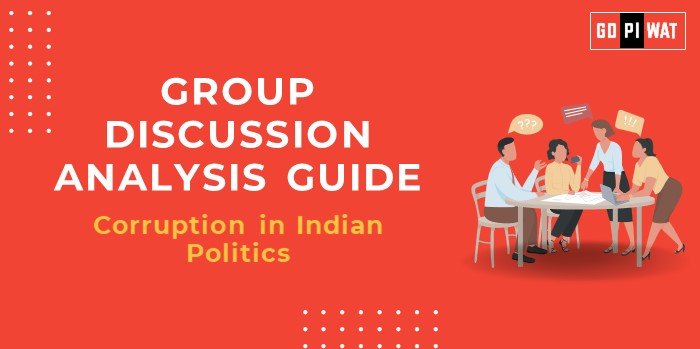📋 Group Discussion (GD) Analysis Guide: Corruption in Indian Politics – Can It Be Eliminated?
🌐 Introduction to the Topic
- 💡 Opening Context: “Corruption in Indian politics remains a pervasive issue, affecting governance, economic development, and public trust. Despite various reforms and anti-corruption movements, the challenge persists, raising questions about the feasibility of its complete eradication.”
- 📜 Topic Background: Corruption in India has deep historical roots, influenced by colonial legacies and socio-economic factors. Over the years, initiatives like the Right to Information Act (2005) and the establishment of the Lokpal and Lokayuktas have been introduced to combat corruption. However, the effectiveness of these measures continues to be a subject of debate.
📊 Quick Facts and Key Statistics
🏅 Corruption Perceptions Index (2023): India ranked 93rd out of 180 countries with a score of 39, indicating a perception of widespread corruption.
📉 Economic Impact: The World Economic Forum estimates that corruption costs India approximately 5% of its GDP annually, affecting economic growth and development.
📉 Economic Impact: The World Economic Forum estimates that corruption costs India approximately 5% of its GDP annually, affecting economic growth and development.
🤝 Stakeholders and Their Roles
- 🏛️ Government Bodies: Responsible for enacting and enforcing anti-corruption laws and policies.
- ⚖️ Judiciary: Ensures the prosecution and adjudication of corruption cases, maintaining the rule of law.
- 📰 Media: Acts as a watchdog by investigating and reporting on corruption, raising public awareness.
- 🌍 Civil Society Organizations: Mobilize public opinion, advocate for transparency, and hold authorities accountable.
- 📖 International Organizations: Provide frameworks and support for anti-corruption measures, such as the United Nations Convention against Corruption.
🏆 Achievements and Challenges
Achievements
- ✨ Right to Information Act (2005): Empowered citizens to seek information from public authorities, promoting transparency.
- 🔍 Establishment of Lokpal and Lokayuktas: Intended to investigate corruption cases involving public officials.
- 💻 Digital Initiatives: E-governance and digital payment systems have reduced opportunities for petty corruption.
Challenges
- ⚠️ Political Interference: Anti-corruption agencies often face pressure, undermining their independence.
- ⏳ Judicial Delays: Prolonged legal processes hinder timely justice in corruption cases.
- 📚 Cultural Factors: Social acceptance of certain corrupt practices complicates eradication efforts.
Global Comparisons
- 🇸🇬 Singapore: Achieved low corruption levels through strict laws and efficient governance.
- 🇩🇰 Denmark: Consistently ranks high in transparency due to robust institutional frameworks.
Case Studies
- 🌱 Kerala: Implemented effective e-governance systems, reducing bureaucratic corruption.
- 🏙️ Delhi: Introduced measures like the Anti-Corruption Branch to tackle local corruption issues.
🗣️ Structured Arguments for Discussion
- ✅ Supporting Stance: “Implementing stringent laws and leveraging technology can significantly reduce corruption in Indian politics.”
- ❌ Opposing Stance: “Deep-rooted systemic issues and cultural acceptance make the complete elimination of corruption challenging.”
- ⚖️ Balanced Perspective: “While absolute eradication may be difficult, sustained efforts can substantially minimize corruption levels.”
💬 Effective Discussion Approaches
Opening Approaches
- 📊 Statistical Highlight: “With India ranking 93rd in the Corruption Perceptions Index, it’s imperative to assess the effectiveness of current anti-corruption measures.”
- 📜 Historical Context: “Despite decades of reforms, corruption remains entrenched in Indian politics, prompting a reevaluation of strategies.”
Counter-Argument Handling
- 🛠️ Acknowledge Challenges: “While cultural factors contribute to corruption, education and awareness can shift societal norms.”
- 💡 Present Solutions: “Strengthening institutional frameworks and ensuring the independence of anti-corruption bodies are crucial steps forward.”
🔍 Strategic Analysis of Strengths and Weaknesses
Strengths
- ✅ Legal Frameworks: Existence of laws like the RTI Act.
- 👥 Active Civil Society: Engaged in promoting transparency and accountability.
Weaknesses
- ⚠️ Implementation Gaps: Laws are often not enforced effectively.
- 🛡️ Political Influence: Interference in anti-corruption agencies.
Opportunities
- 🤖 Technological Advancements: Utilizing AI and blockchain for transparency.
- 🌏 International Collaboration: Learning from global best practices.
Threats
- 🚫 Entrenched Interests: Resistance from those benefiting from corruption.
- 😔 Public Apathy: Lack of sustained public pressure for reforms.
🎓 Connecting with B-School Applications
- 🏢 Real-World Applications: Understanding corruption’s impact on business environments and ethical decision-making.
- 🎤 Sample Interview Questions:
- “How can businesses navigate and mitigate the risks of political corruption in India?”
- “Discuss the role of corporate governance in combating corruption.”
- 📘 Insights for Students:
- Engage in internships with organizations focused on transparency.
- Develop research projects analyzing the effectiveness of anti-corruption measures.


